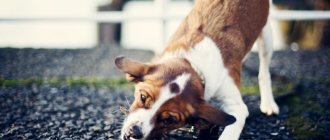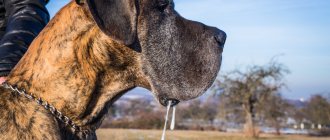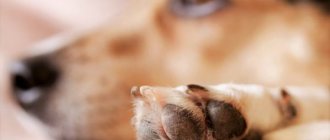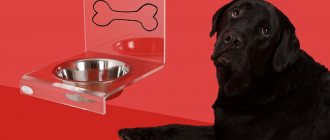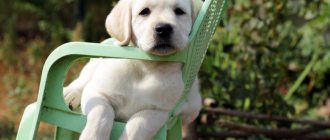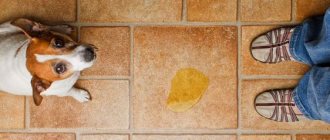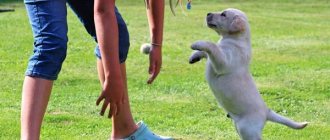Causes
There are several possible explanations for why your dog is peeing in his sleep. When you take the time to learn about these explanations, you will likely be able to figure out why your dog is doing this.
Diabetes
If your dog has diabetes, he may have trouble urinating while he sleeps. Dogs with this condition tend to urinate a lot more than usual, which can lead to accidents. Diabetes is a very serious disease for both humans and dogs.
Some of the other symptoms of diabetes in dogs to look out for include:
- Lethargic behavior
- Increased thirst
- Weight loss
- Increased appetite
There are effective treatments for dogs with diabetes, but you need to get a diagnosis as soon as possible. This condition can usually be managed well over a long period of time.
Bad dream
It's even possible that your dog was peeing in his sleep due to a particularly bad dream. Behaviorists have all but confirmed that dogs dream just like humans do. If your dog is really excited in his sleep, he may pee.
© shutterstock
Kidney disease
Your dog's kidney problems may also be causing this behavior. Dogs with this condition usually drink a lot of water and may sometimes urinate in the house. If you notice your dog exhibiting muscle weakness or confusion in addition to peeing in his sleep, he may have kidney disease.
Although there is no cure for kidney disease, it can be managed with medication. Your veterinarian will likely want to run some blood tests to diagnose this condition and find out how advanced it is.
The dog has recently been spayed or neutered
If you recently spayed or neutered your dog, he may urinate in the house for the first few days after the procedure. As annoying as this may be, it is completely normal under the circumstances.
A spayed or neutered dog may develop problems with its sphincter muscles, which may also cause it to defecate in the house. Although this problem is usually temporary, it can last for years if complications arise during surgery.
Urinary tract infection
A urinary tract infection, or UTI, is often the reason why dogs urinate in their sleep. While this is not one of the most serious infections your dog can get, it still needs to be treated promptly.
It's normal for dogs with UTIs to drink a lot more water than usual, so it's not uncommon for them to pee in their sleep. If your dog wakes up with a full bladder, he may have an accident on the bed or on the floor.
Some of the other symptoms of UTI in dogs include:
- Blood in urine
- Cloudy urine
- Licking near the urinary opening
- Fever (if infection progresses)
- Frequent urination
You should take your dog to the vet immediately if he exhibits these symptoms. It is very important to treat this infection as soon as possible. If the infection progresses, it can cause serious damage to your dog's kidneys.
Neurological problems
In some cases, a dog may urinate in its sleep due to neurological/brain problems. This could be anything from dementia to spinal cord conditions. These conditions are very serious and difficult to treat. If a certain part of your pet's brain is affected, he may develop urinary incontinence.
© shutterstock
Some of the other symptoms of neurological problems in dogs include:
- Convulsions
- Changing your dog's gait
- Lack of coordination
- Indifferent behavior
- Excessive drooling
Other causes of uncleanliness in dogs
- At night, puppies and young dogs most often defecate. The puppy simply cannot wait until the morning due to the long time intervals between walks and pees at home. In puppies, the urinary system is not sufficiently developed, so the dog cannot withstand 7-8 hour breaks between walks.
- If a dog pees at night, this behavior may be caused by irregular feeding, increased thirst (the dog drinks a lot of water before bed), or a failure in the daily routine.
- A dog may urinate at night because it is in pain. The cause is most often acute pain syndrome.
- Diabetes mellitus is another reason that explains the uncleanliness of a dog. A dog with diabetes urinates most often at night.
- A dog may urinate at night because the bedding, or the places where the pet has previously urinated, smells of its “marks.”
- If your dog pees at night, the dog may have gotten cold during a walk, or you and your dog have been caught in the rain . This behavior is most often observed during the cold season, especially in dogs with problems with the genitourinary tract.
How to help a dog
Here are some helpful tips you can follow to reduce the chance of your dog peeing in his sleep.
- Take her for a walk before bed . Sometimes you can stop your dog from peeing in his sleep by simply taking him out to the toilet before you go to bed. The last thing you want is for your dog to fall asleep with a full or nearly full bladder.
- Limit your water intake . If your dog is drinking more water than usual for medical reasons, you should limit his access. This can help prevent their condition from getting worse and reduce the likelihood of accidents in the home.
- Take your dog to the vet . You may need to take your dog to the vet, especially if his abnormal urination is caused by a serious health problem. Whether it's a urinary tract infection or diabetes, you need to get the right treatment for your dog.
Why does a dog urinate at night?
If your dog periodically or constantly urinates at night or relieves himself in the wrong place, to solve this problem, here are the most common causes of uncleanliness:
- Marking the territory. As a rule, dogs, especially males, can crap in houses, marking their territory during the rutting period. This behavior is also possible if another animal or new objects appear in the house. By leaving his marks, the dog thus indicates his social status. And this can be done not only during the day, but also at night, when the owners are sleeping and cannot scold the pet.
- Insufficient walk in the evening. You need to walk your dog several times a day, morning and evening. The minimum walking time is 30-40 minutes. One of the walks should take at least 1.5-2 hours. Walking time depends on the dog’s physiology, age, health, and weather conditions. At the same time, during a walk, the pet should not only run and frolic with its relatives, but also go to the toilet.
- To attract attention . Cynologists and animal psychologists explain a dog's uncleanliness by saying that the dog does not receive enough attention from its owners and thus attracts attention.
- Phobias, fears, stress. A dog may urinate at night due to simple fear, under the influence of any strong stimuli (fireworks, firecrackers, thunderstorms). Uncleanliness can be caused by the fact that the dog has suffered severe stress and emotional arousal.
- Health problems. This is one of the most common reasons why dogs pee at night, during sleep or during the day. Cystitis, urolithiasis, inflammatory processes, acute and chronic renal failure are diseases that explain your dog’s uncleanliness.
- Rough treatment. If you constantly shout, hit your dog, or use physical violence in the process of training, do not be surprised that puddles or piles will appear in the house from time to time.
- Problems in education. Perhaps the owner made mistakes in training the dog or the dog is simply spoiled.
Conclusion
- Diabetes is not uncommon among dogs and can cause some to urinate during sleep. This is due to the increased thirst that dogs with this condition often experience.
- If your dog is dreaming, he may urinate in his sleep.
- Kidney disease is another common explanation for this behavior in dogs, as it also causes increased thirst.
- If you recently spayed or neutered your dog, he may have had accidents around the house in the first few days.
- In some rare cases, spayed or neutered dogs develop irreversible conditions related to the sphincter or urinary tract.
- A urinary tract infection may also explain why your dog is peeing in his sleep. This is not an inherently life-threatening condition, but you will want to get it treated quickly.
- Neurological problems such as dementia or spinal cord disease can cause urinary incontinence in some dogs.
What to do if your dog pees at night
Determine how often your pet needs to relieve itself. In this case, increase the number of walks and the duration of walks. The duration of short walks should be at least 30 minutes.
- It is useless to scold, beat, or shout at a dog if it pees at night, in its sleep. You need to punish precisely at the moment when you take your pet by surprise.
- If the dog pees at night, feed the dog an hour and a half before the evening walk. In summer, always take drinking water with you when going for walks. After a walk, the dog will feel less thirsty.
- Follow the regime and daily routine. Walk your dog at the same time every day. Make sure that during the walk the dog fulfills all its physiological needs.
- If your dog frequently urinates at home at night, take him outside for a few minutes to sleep.
- Keep your house clean. Even if the dog has urinated in the wrong place in the apartment, thoroughly wash the “crime scenes” with household chemicals.
- Monitor your dog's diet. If an animal is diagnosed with any pathologies, certain foods can affect the functioning of the genitourinary system.
- Make sure that in winter, during the cold period, the dog does not freeze. Shorten the walking time in rainy, damp, windy weather. For small dogs, buy clothes and shoes for dogs.
- If your pet constantly urinates not only at night but also during the day, take the animal to the clinic for an examination.
- Pay as much attention to your pet as possible. The dog should feel your care and love.
If all else fails, consult a dog trainer or animal psychologist. The specialist will recommend a method for correcting this behavior.
Age-related features of incontinence and their correction
The basic reason you need to focus on when teaching your puppy toilet etiquette is age. Let's take a closer look at age-related features of incontinence and their correction.
At absolutely any age, a dog can make a puddle, only because it could not bear it before walking.
Recent studies have shown that litter box trained dogs are much less likely to suffer from urolithiasis in old age and live longer. There is only one conclusion: going to the toilet is harmful to your pet’s health.
Up to 3 months
Before the age of 3 months, puppies are physically unable to control the process of urination. To go to the toilet in the right place, the baby needs to apply all his mental and physiological abilities only to this process.
Until the Puppy is 4 months old, you should not expect him to be able to concentrate and control the urge to urinate. Material damage can be reduced by accustoming the puppy to an approved place of residence, but we will discuss this below.
Up to 6 months
By the age of 6 months, the puppy must be trained to use the toilet outside. In order for your pet to develop an algorithm of actions, it must be walked after each meal. On a walk, when the puppy goes to the toilet, he needs to be generously praised.
Important! Walking in public areas is not safe until the puppy has received basic vaccinations.
If the house has an authorized place for relieving itself or there is a litter box for the dog, do not rush to remove them. Even if the puppy tries very hard, the likelihood that he will not always endure before walking is too high.
Under one year of age
From the age of 6 months to one year, subject to active training for walking, problems associated with emptying the bladder in the home should rapidly decrease. If your dog constantly pees in the house, you should think about litter box training.
A dog may urinate in the home if it is not walked on time or if it consumes too much water - these are expected consequences. In all other cases, if the puppy regularly pees at home, it is better to consult a veterinarian.
Psychological causes of incontinence in small puppies
If you are not prepared for puddles and other “surprises” in your home, it is better not to get a puppy. Yes, everything is so categorical. Even the most intelligent, loyal and well-behaved puppy will break the rules of behavior in the house and will do this more than once.
The younger the puppy is, the more likely it is that he makes puddles in his home unintentionally. The reasons may be physiological and psychological. Regardless of the reasons, periodic wet crimes before the age of 4 months are considered absolutely normal.
Note! Psychological causes of incontinence in young puppies are almost always related to emotions or, in rare cases, indicate pathology.
Puppy peeing out of joy or fear
Giving in to emotions, the puppy may wet itself out of joy or fear. All physiological processes in the body are subordinated to the nervous system. When a puppy experiences severe stress associated with new sensations, the resources of the nervous system are aimed at preserving the psyche, and not physiology.
If the puppy peed itself when it met you at the front door or when you raised your voice at it, you can be sure that the reason is the emotions that the baby experienced. Draw conclusions, since such stress negatively affects your overall health. If your puppy pees frequently when greeting you from work, most likely you are paying too little attention to him.
Important! Punishments that drive a puppy into panic are unacceptable.
From an overabundance of other emotions
Puppies are very curious and open to any information. Until about one year of age, a dog may involuntarily urinate due to an overabundance of other emotions.
Your pet experiences intense emotions from literally every event it sees for the first time. Babies may fall into a state of physical stupor for a reason that the owner is unable to foresee.
The dog may have phobias of loud noises, water or other irritants and urinate while in a stupor. Overexcitement, which the dog gets into during training or too active games, can lead to an unpleasant surprise. However, all psychological causes of incontinence have a common feature - a repetition algorithm after similar events.
Pissing in my sleep
If a dog pees in its sleep, the reasons may be both physiological and psychological. Puppies under the age of 4-6 months can urinate on themselves in their sleep only because they sleep very deeply and do not feel the urge to urinate.
If the puppy is 6 months old, but continues to pee in his sleep, the reason may be pathologies of the genitourinary system or colorful dreams. By the way, just 3-4 years ago, scientists did not recognize that dogs dream. To date, this fact has been proven and confirmed scientifically. However, if your puppy urinates in his sleep regularly, it is best to contact your veterinarian.
Physiological causes of incontinence
It is important for the future owner to know the physiological causes of urinary incontinence. Uncontrollable urination or the inability to go to the toilet at any age can lead to health problems. At risk are dogs kept in violation of generally accepted rules, young females, and elderly pets.
A dog can pee for the following physiological reasons:
- Inflammation of the genitourinary system - leads to a constant urge to urinate. Over time, the dog cannot distinguish between true and false urges, and therefore cannot control the process itself.
- Urolithiasis – when sand or stones form in the kidneys, bladder or ureters, the dog suffers from constant pain. In addition, the pet has problems with urination; he feels that he needs to go to the toilet, but cannot do it. As a result, the dog empties its bladder as soon as possible (physiologically).
- First heat - this process is accompanied by noticeable discomfort in the peritoneal area. The dog regularly experiences false urges to urinate. In addition, the dog's mucous membranes of the genitourinary tract are severely irritated. As a result, the dog empties its bladder very often and cannot control the urge.
Physiological reasons include the designation of territory. During puberty, dogs begin to need to mark their territory with the smell of urine and sometimes feces. Typically, such problems are observed in young male dogs who begin to mark the perimeter of the home. The problem is solved by castration.
